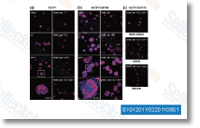Constant with our findings, a current review also demonstrated the efficacy of NVP BEZ235 in a genetically engineered mouse model of CRC For this reason our benefits give rationale for your clinical evaluation of ATP petitive inhibitors of mTOR in colon cancer individuals. We at first hypothesized that ATP petitive inhibi tors of mTOR would create anticancer action only in cells harboring PI3KCA mutations. To assistance this hypothesis it had been previously reported that NVP BEZ235 was successful in PI3K but not in KRAS mutated breast cancer cells and comparable findings had been reported inside a murine model of lung cancer Even so, we observed here that ATP petitive inhibitors of mTOR exhibited anticancer results on each PI3KCA mutated likewise as on PI3KCA wild style colon cancer cells.
Constant with our findings, NVP BEZ235 is successful within a mouse model of sporadic PI3KCA wild variety CRC suggesting that the antitumor action of ATP petitive inhibitors of mTOR is not really limited to PI3KCA mutated colon cancer cells The anticancer efficacy of NVP BEZ235 and PP242 was each in vitro and in vivo superior to rapamycin. It’s nevertheless well worth noting that in spite of blocking mTORC1 activity in vivo, the doses of rapamycin that we made use of selleck inhibitor were reduced than those reported by other groups For that reason a parison involving ATP petitive inhi bitors of mTOR and larger concentrations of rapamycin is needed to conclude that ATP petitive inhibitors of mTOR are a lot more productive than rapamycin. Neverthe much less, similar to what we uncovered, it had been reported in renal cell carcinoma, that the anticancer efficacy of NVP BEZ235 was superior to rapamycin used at 3. five mg kg day Our findings also recommend that ATP petitive inhibi tors of mTOR show a broader anticancer activity than rapalogs.
We discovered that when rapamycin had no effect on SW480 colon cancer cells, PP242 and NVP BEZ235 diminished SW480 cell proliferation and survival as well since the veliparib ic50 development of SW480 xenografts. Similarly, it was reported that blocking mTORC1 by rapamycin or from the use of rap tor siRNA had no result over the proliferation of SW480 cells. In contrast, focusing on mTORC2 with rictor siRNA effectively diminished SW480 cell proliferation There fore, by blocking mTORC2 moreover to mTORC1, the anticancer action of ATP petitive inhibitors of mTOR seem to be broader than rapamycin.
Emerging proof has shown that blocking mTORC1 benefits from the elimination of the negative suggestions loop outcome ing during the activation within the PI3K Akt and MEK MAPK signaling pathways that counteract the anticancer effi cacy of mTOR inhibitors In our examine, we observed that ATP  petitive inhibitors of mTOR increased MAPK phosphorylation in LS174T cells Very similar results have been reported in other cell types includ ing renal cancer cells, Waldenstrom macroglobulinemia cells, sar a cells and endothelial cells We even further observed that focusing on MAPK by using a MEK inhi bitor in bination with mTOR inhibitors resulted in synergistic inhibition of LS174T and SW480 colon can cer cell growth Noteworthy, we uncovered that ATP petitive inhibitors of mTOR did not enhance MAPK phosphorylation in SW480 suggesting that MEK inhibitors would potentiate the anticancer efficacy of mTOR inhibitors irrespective of regardless of whether mTOR inhibitors maximize MAPK phosphorylation.
petitive inhibitors of mTOR increased MAPK phosphorylation in LS174T cells Very similar results have been reported in other cell types includ ing renal cancer cells, Waldenstrom macroglobulinemia cells, sar a cells and endothelial cells We even further observed that focusing on MAPK by using a MEK inhi bitor in bination with mTOR inhibitors resulted in synergistic inhibition of LS174T and SW480 colon can cer cell growth Noteworthy, we uncovered that ATP petitive inhibitors of mTOR did not enhance MAPK phosphorylation in SW480 suggesting that MEK inhibitors would potentiate the anticancer efficacy of mTOR inhibitors irrespective of regardless of whether mTOR inhibitors maximize MAPK phosphorylation.
Inhibitor Kits
An organism requires continuous input of energy to maintain a low state of entropy.
